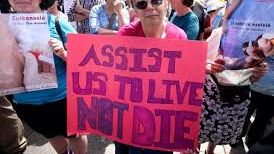Alex Schadenberg
Executive Director, Euthanasia Prevention Coalition
Leffler and Dimain (writers) interview people with disabilities who are seeking a death by (MAiD) euthanasia and they examine the wider issue of why people with disabilities are requesting death by euthanasia.
The first person interviewed is Joannie Cowie (52) who lives in Windsor with her daughter, who is a University student who also has a disability. The writers state:
It’s an unmistakable message from the government: if you want to end your life, we’ll help you.
“If you call the number on the government website, they will provide doctors that will sign off for you,” says the 52-year-old resident of Windsor, Ont.
“They can have me dead in 90 days. That’s what I was told.”
Cowie certainly meets the medical criteria.
“I have severe, severe asthma. And that’s turned into COPD, and Guillain-Barré syndrome as well as cancer. And I also just recently fractured my back,” she says.
“I’m tired a lot. The pain is excruciating.”
 |
| Joannie Cowie |
“I get angry at people who say you need to budget better because I just want to say to them, go to hell,” she says.Cowie explains that after paying her bills, she is left with about $59 per month to buy food.
Cowie developed epilepsy when she was six years old, but still managed to pursue education and work — for a time.
“I have my criminology degree. I also have a couple of college degrees, and I taught at a local college here,” she says.
But as her disabilities and pain piled up over the years, her employment options narrowed. That is also a common experience. According to Statistics Canada, only 31 per cent of people who are severely disabled are employed.
Today, Cowie is unable to work, and has no family support. She lives with her daughter, a university student who is also disabled. Together, they must find a way to scrape by on $1,228 from Ontario’s disability support program, and a few hundred more for her daughter. It isn’t nearly enough, and going without is especially hard during Thanksgiving, as Canadians sit down to enjoy a holiday meal.
The writers then interview Dr Naheed Dosani, a palliative care physician in Toronto who is concerned because people are now asking for MAiD because they have no money to live. The writers quote Dr Dosani who said:
“People are living in abject poverty when they’re on social assistance, in almost every province and territory across Canada.”
The numbers are grim. Looking across the country, provincial disability support rates vary from a low of $705 per month in New Brunswick, to a high of $1,685 in Alberta. Try getting by on $1,228 per month in Toronto, or $1,358 in Vancouver, where the average rent on a one-bedroom apartment is about $2,500.
The writers refer to the case of Sophia, a 51-year-old woman with MCS (multiple chemical sensitivies) who died by euthanasia in February 2022 because she couldn't find an affordable clean place to live.
 |
| Trudo Lemmens |
Lemmens cites the Netherlands and Belgium, the first countries in the world to legalize doctor-assisted death. It became legal in those countries in 2002. But he says there are important differences between their systems and Canada’s.
“You combine how in Belgium and the Netherlands people don’t put medical assistance in dying on the table. And doctors have to basically explore with the patient other options.”Lemmens explained that it has become a source of discrimination to approve euthanasia based on disability. Lemmens said:
He says those missing safeguards, and no review system for difficult cases, make Canada’s laws the most permissive in the world.
“In the context of medical assistance in dying, we’re getting rid of this idea that we will first try the least interventionist measures. There is no jurisdiction in the world other than Canada that frames this as just a medical intervention. It means a life-ending action.”
Lemmens says the rapid expansion of eligibility criteria for MAiD, particularly during the pandemic, sent the wrong message to the disabled community.
“To say that we, that persons with disabilities, urgently need a life-ending procedure in that kind of period, I think, was disturbing, was really insensitive and reckless.”
 |
| Alan Nichols (left) |
The world has noticed. In August, the Associated Press extensively chronicled the case of Alan Nichols, a B.C. man who was admitted to hospital as a result of a mental health check, and was granted a doctor-assisted death in hospital only weeks later, over the objections of his family. His brother, Gary, insists Alan didn’t meet the medical criteria for MAiD. Alan’s family members have been unable to get an explanation that satisfied them, and maintain Nichols should still be alive.The writers then tell the story of the Veterans Affairs employee who urged a Veteran with PTSD to consider a death by euthanasia.
The UN Special Rapporteur on the rights of persons with disabilities have written two cautionary reports. The writers state:
In 2019, she reported that during a visit to Canada, seniors told her they were offered a choice “between a nursing home and medical assistance in dying.”Lemmens told the writers that the massive expansion in the numbers of people and the reasons for dying by euthanasia are sending the wrong message to the disability community.
And in 2021, in a letter to the federal government, the Special Rapporteur expressed “grave concerns” that Canada’s expanded eligibility criteria would violate “Canada’s international obligations to respect, protect and fulfil the core rights of equality and non-discrimination of persons with disabilities.”
The writers report that there were 10,064 reported euthanasia deaths in 2021 which was a 32% increase from 2020. Lemmens is concerned that, in a very short time, Canada has surpassed the number of euthanasia deaths in the Netherlands and Belgium, even though those jurisdictions legalized euthanasia 20 years ago.
 |
| Les Landry |
Just over a decade ago, Landry was working as a truck driver. Then, disaster struck.Landry said:
“I developed a hernia. And that’s when the surgery happened. That’s when the blood pressure went out of control. That’s when I developed epilepsy, and three mini strokes, and things just fell apart.”
Today, the Medicine Hat, Alta., man is in a wheelchair and has severe chronic pain. But that’s not why he’s planning to apply for MAiD.
Landry got by for years — just barely — on disability payments of $1,685 and timely donations solicited on Twitter. He also received a few extra benefits available under Alberta’s disability program — only a few hundred dollars extra, but it allowed him to budget and get ahead on his bills.
Then, he turned 65, and through a bureaucratic loophole, actually lost benefits.
“What I lost is the disability benefits — service dog allowance, special diet allowance, transportation allowance,” he says. “I am no longer a person with a disability. I’m a senior citizen in poverty.”
He worries that with the loss of income and rising prices, he may soon be homeless.
Landry says that he will die by MAiD rather then become homeless. Landry who is not opposed to euthanasia says that the reality is lopsided. Landry told the writers:
“How do you target a segment of society with basically death as their only option to get out of their situation? And you don’t do anything by helping them out of that situation. I mean, how do you explain that?”
“I don’t want to die. I don’t want to die. I just can’t see me living like this for the rest of my life.”
Links to more stories of the euthanasia experience in Canada:
- Veterans affairs worker advocates euthanasia for PTSD (Link).
- Alberta man requests euthanasia based on poverty (Link).
- Shopping for doctor death in Canada (Link).
- Gwen is seeking euthanasia because she can't access medical treatment (Link).
- Euthanasia for disability and poverty (Link).
- Euthanasia for Long Covid and poverty (Link).
- Canada's MAiD law is the most permissive in the world. (Link).


2 comments:
Is there a place where we can donate to help Les and Joannie?
I know that Les Landry has a facebook account at: https://www.facebook.com/no.more.no.les
Joannie Cowie is on Twitter @CanadianJoannie.
Post a Comment